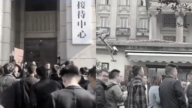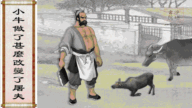【新唐人2011年12月8日訊】大陸法學界上個月在北京舉行了一個研討會,會上傳出中共最高人民法院院長王勝俊罹患胰臟癌的消息。消息一傳出,會場內卻響起如雷掌聲。外界認為,掌聲代表某種民意,也折射出中國司法偏離後,很多人對中國司法改革不進反退的失望心情。
北京律師梁小軍日前在微博上透露,京城司法界舉行了一個冤案研討會,會上有人提到最高人民法院院長王勝俊得了胰腺癌時,場上掌聲雷動。
梁小軍表示,王勝俊在執政期間,有好多案件經不起歷史的考驗。搞得民怨四起,所以掌聲可能代表著一種民意。
北京律師梁小軍:「因為當時旁聽的,就是說在那開會的有很多是受害者的家屬,是一個死刑案的受害者家屬和定刑的受害者本人。然後等於他們經受了酷刑,然後又經過10多年的審判,就等於說是家破人亡、妻離子散那種。所以他們聽到這個消息以後,他們可能是,就是感覺,就是一種受到迫害以後,他們感覺很解氣,所以更多的掌聲是由他們發出的。」
65歲的王勝俊是安徽人,合肥師範學院歷史系畢業,曾任安徽省公安廳長,後調中央政法委任秘書長。2008年升任最高人民法院院長。
據了解,沒有任何法律背景的他出任中共最高人民法院院長,令法學界譁然,加上他任職期間,司法改革不進反退,更受法學界詬病。
北京維權律師李和平表示,為甚麼那麼多人聽到這樣一個消息的時候,大家竟然鼓掌,這值得思考。
李和平:「自從王勝俊院長當了法院院長之後,中國的司法是一種非常非常明顯的這種,說倒退還不是,是偏離了法制的軌道,甚至說是一種背離。很多人對中國的法律很失望,對這個法制的這種破壞感到很痛心。那麼就是說,他們就把這個責任歸咎到王院長身上。都希望他,甚至就是按照中國的話,甚至就是盼望他早點離開。」
法學專家、北大教授賀衞方指出,王勝俊曾提出政法工作要堅持三個至上,他不強調依法,而強調政治,致使近幾年,法院淪為當局維穩的工具。舊寃案得不到伸張,又出現大量新的寃案,導致訪民如潮,民怨沸揚。
而自1999年江澤民發動的迫害法輪功以來,法院配合中共當局枉判法輪功學員的案例歷歷在冊。《歐洲圓明網》報導,今年﹙2011年﹚6月27號星期一上午,常德市武陵區法院代替常德市中級法院轉交一份判決書,沒有庭審。7名法輪功學員被非法重判,他們是:劉先菊十年、王曉輝九年、李海軍八年六個月、劉慧平七年六個月、曾麗華七年、滿三清五年、陳陵慈三年。
浙江民主人士鄒巍:「任何人,包括是法輪功啊甚麼的,都不應該因為自己的信仰、煉功遭到迫害,特別是國內的法輪功我們知道。據我了解的國內的法輪功(學員),我感覺到是所有人民最善良的群體。因為當初煉法輪功好多都是抱著強身健體,行善的這樣一些人。所以我認為對那些法輪功這樣善良的人視作敵人、打壓迫害,這肯定是一種罪惡。」
也因此,賀衞方教授表示,一個完全不懂法律的人,去主管司法,這是中國司法的悲哀!
新唐人記者唐睿,孫寧採訪報導。
Chinese Applaud CCP Supreme Court President’s Cancer
At a judicial seminar recently held in Beijing, news came out
about Wang Shengjun’s affliction of cancer.
Wang was the Pesident of the Supreme People’s Court of
Chinese Communist Party (CCP).
The seminar attendees gave thunderous applause to
the news.
Comments say the applause represents a kind of public opinion,
and also reflects that many people felt disappointed with
China’s judiciary deviating from the rule of law, and
retrogression in China’s judicial reform.
Beijing-based lawyer Liang Xiaojun revealed on his micro blog,
at a recent seminar on judicial injustice held in Beijing,
someone mentioned that the President of the Supreme
People’s Court, Wang Shengjun,
has contracted pancreatic cancer.
The news provoked a round of applause.
Liang Xiaojun comments, during Wang’s terms of office,
many cases of injustice have been generated,
which triggered widespread public discontent.
So the applause may represent a kind of public opinion.
Beijing-based lawyer Liang Xiaojun: “Because many of the
attendees to that seminar are families’victims of judicial injustice.
They are the families of a victim of a death penalty
case and the victim who receives a jail term.
Excruciating pain and 10 years of trial resulted in a complete
break-up of their families.
So I think when they heard the news,
they felt like venting their anger, thus more applause were given by them. “
65-year-old Wang Shengjun is from Anhui province,
a history graduate from Hefei Teachers College.
Wang was former chief of Anhui Province Public Security
Department.
Later, he was named as Secretary-General of the
CCP Central Politics and Law Committee.
In 2008, Wang Shengjun was promoted to the President of
the Supreme People’s Court.
hen Wang was appointed President of the Supreme
People’s Court,
China’s legal community voiced outcry,
since Wang has no prior legal background.
Wang’s tenure brought retrogression rather than progression
to China’s judicial reform, incurring more criticism by the legal sector.
Li Heping, rights lawyer in Beijing, believes that so many
People applauded such news, this is worth thinking about.
Li Heping: “Since Wang Shengjun became Supreme Court
President,
it can be seen very obviously that China’s judiciary veers off
the path over the rule of law, to be precise, that is a deviation.
Many people are disappointed with China’s laws,
they felt very sad about the ruining of the rule of law.
So they think Wang should assume the responsibility,
that is, they expect him to leave as soon as possible. “
Legal experts, He Weifang, a professor at Peking University,
said that
Wang Shengjun instructed the political and legal workers
to adhere to three priorities.
Wang never claimed ruling by law, but rather emphasized
ruling by politics.
This turned China’s judiciary into the CCP’s tool for stability
maintenance in recent years.
New cases of injustice have thus been massively generated
while piles of old ones remain unsettled, creating waves of petitioners
and growing civilian resentment.
Since Jiang Zemin launched the persecution of Falun Gong in
1999, China’s judiciary system has actively cooperated with
the CCP regime to make unjust judgments
over Falun Gong cases.
Yuanming.net reports that in June, Wuling District Court of
Changde city, without going through the trial process,
replaced Changde Intermediate People’s Court
to hand down a guilty verdict.
Seven Falun Gong practitioners were illegally sentenced
to labor camp: Liu Xianju: 7 yrs; Wang Xiaohui: 9 yrs;
Li Haiyun: 8 yrs; Liu Huiping: 7 yrs; Zeng Lihua: 7yrs;
Man Sanqing: 5 yrs; and Chen Lingci: 3 yrs.
Zou Wei (Zhejiang-based democracy activists):
“Nobody should be subjected to persecution for their beliefs.
Especially those Falun Gong practitioners, we all know they
are persecuted for their beliefs and practicing exercises.
My personal experiences tell me that Falun Gong
practitioners are a group of kind-hearted people.
Many of them began to practice Falun Gong only for gaining
health and becoming a better person.
Now the authorities view them as enemies and crack down on
them, I think this is certainly an evil act. “
Renowned legal expert and professor, He Weifang,
comments that a person without any legal knowledge could
be appointed head of the judicial system, that’s the real
tragedy of China’s judicial system!
NTD reporters Tang Rui and Sun Ning.




























